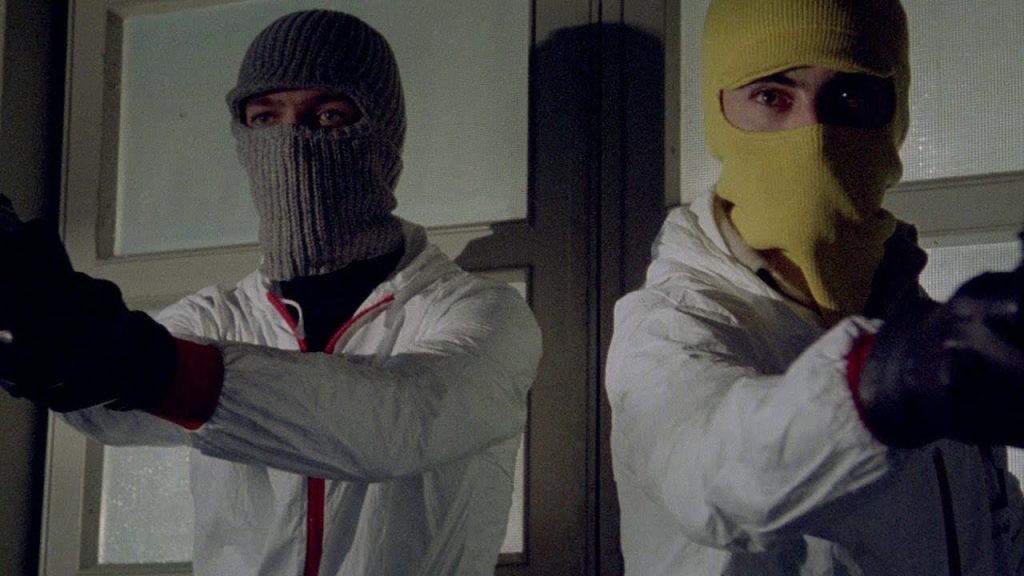The 1970s were a time of intense uncertainty and instability in Italy. Political corruption and widespread acts of left and right-wing terrorism, alongside a breakdown in social cohesion and a loss of trust in public institutions such as the government and police, created a febrile atmosphere of cynicism, paranoia and unexploded rage. Throughout this period, these sentiments found expression in a series of brutal, often morally ambiguous crime thrillers which tapped into the atmosphere of violence and instability that defined the so-called Years of Lead. This box set gathers five films from the heyday of the “poliziotteschi” – the umbrella term used to describe this diverse body of films. In Vittorio Salerno’s Savage Three (1975) and Mario Imperoli’s Like Rabid Dogs (1976), random acts of violence committed by vicious young sociopaths threaten the fragile fabric of respectable society. In Massimo Dallamano’s Colt 38 Special Squad (1976) and Stelvio Massi’s Highway Racer (1977), renegade cops battling against red tape and political corruption turn to new and morally dubious methods to dispense justice. Finally, class dynamics are explored in Salerno’s No, the Case is Happily Resolved (1973) as an innocent man finds himself under suspicion for a savage crime committed by a highly respected member of society. Featuring an impressive line-up of Euro-cult stars, including Joe Dallesandro (The Climber), Ivan Rassimov (Your Vice Is a Locked Room and Only I Have the Key), Maurizio Merli (Violent City) and Enrico Maria Salerno (The Bird with the Crystal Plumage), this collection of stylish, hard-hitting Euro-crime thrillers showcases the range and breadth of the genre and is a must-have for newcomers and grizzled veterans alike.
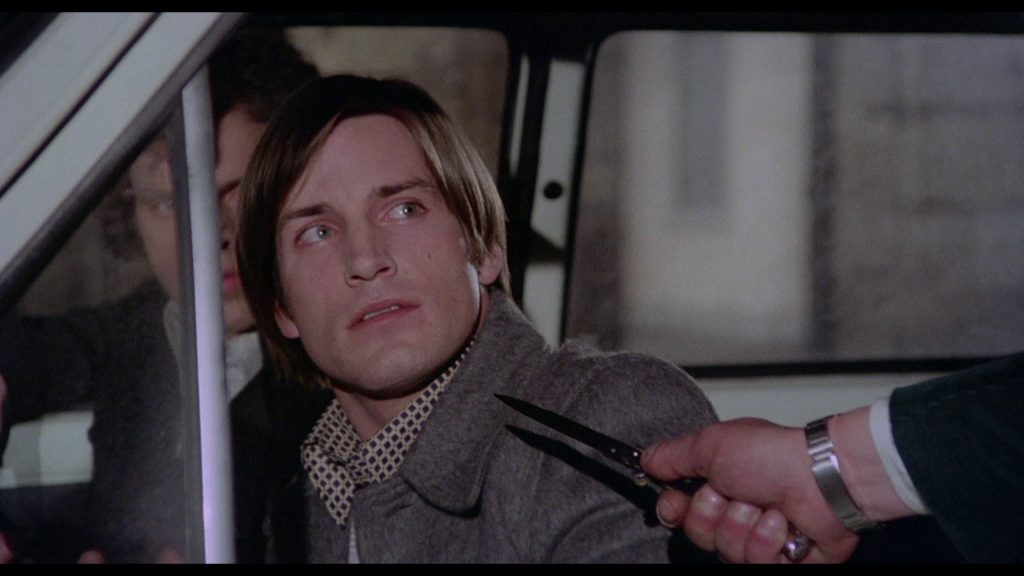
Savage Three (1975)
By day, Ovidio (Joe Dallesandro, The Climber) and his two friends work at a data center. After work, they blow off steam by committing random acts of savage violence, swiftly graduating from sparking a riot at a football game to vehicle theft, rape and murder. The police are convinced this recent spate of crimes is politically motivated, but world-weary veteran Commissario Santagà (Enrico Maria Salerno, The Bird with the Crystal Plumage) suspects a far more terrifying explanation: that these young men are motivated by nothing more than boredom and disaffection with civilized society. As Ovidio’s behavior escalates, a psychological game of cat-and-mouse ensues between the two adversaries, building towards a shocking final confrontation.Directed by Vittorio Salerno (No, the Case is Happily Resolved) from a script co-written by Italian cult veteran Ernesto Gastaldi (The Case of the Scorpion’s Tail), Savage Three combines unrestrained brutality with biting social commentary to create a tense and frightening portrait of modern man and his innate capacity for violence.
The movie that first came to mind upon watching this one is Stanley Kubrick’s A Clockwork Orange. Now this film comes nowhere close to the brilliant social commentary present in that cinematic classic, but the poor behavior from our three young men can be just as nasty as Alex and his gang. Director Vittorio Salerno appears to relish in unchaining these men from the conventions of society, but it is not always apparent if he has a solid interest in critiquing society or if the mere sight of these offenses is the goal – to shock audiences by how far the film dares to go. The film starts off with an abrasive, rocking opening that sets up the parallels of mice being tested in their cages with the cage that that society has put around these young men. It is an obvious metaphor, but this is not a film built for subtlety. The performances from the three leads are unnerving in their steely, calculating malevolence that begins with the theft of a bike and escalates all the way to a forklift in the chest. The movie is a sick bit of entertaining business, but those wanting a biting social critique may find this lacking in favor of unrepentant nihilism.
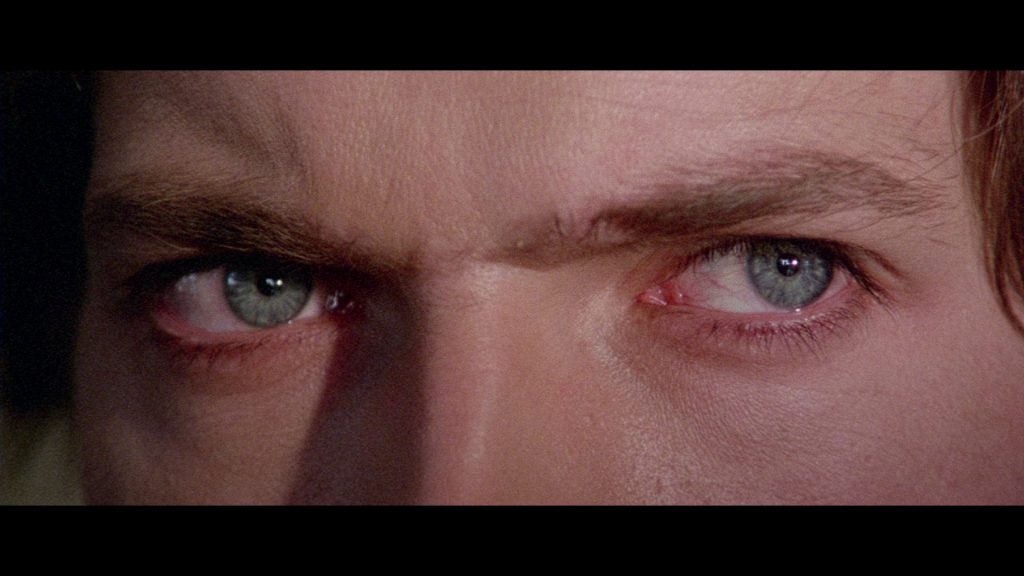
Like Rabid Dogs (1976)
Three wealthy youths – ringleader Tony (Cesare Barro, Violence for Kicks) and his friends Rico (Luis La Torre, Evil Eye) and Silvia (Annarita Grapputo, Magnum Cop) – get their kicks from committing a series of random thefts and murders. Commissario Muzi (Jean-Pierre Sabagh a.k.a Piero Santi, Vow of Chastity) is on the case but can’t make anything stick on the over-privileged thugs. Realizing that justice is a rare commodity when it comes to the wealthy and powerful, Muzi and his lover and fellow cop, Germana (Paola Senatore, The Killer Reserved Nine Seats), plot to entrap Tony and his friends – but fail to anticipate just how ruthless these “rabid dogs” can be… Ranking among the most brutal of all the poliziotteschi, Like Rabid Dogs depicts a bitterly divided society in which being born into wealth seems to equate to a license to commit the most outrageous acts of violence without repercussions. Directed by Mario Imperoli (Canne mozze), this ultra-violent, ultra-cynical thriller combines grindhouse exploitation with an almost nihilistic worldview for unforgettable – and at times shocking – results.
Like Rabid Dogs champions much of the same spirit as the preceding film in this set, but it appears to stick the social criticism much more elegantly despite being just as nasty. This film once again wastes no time getting to the meat of the conflict as the film opens on our trio of thieves committing a violent robbery at a soccer stadium that leaves a man dead with further ramifications to splinter out. There is no question who our antagonists are from the onset, and the film is benefitted by making one of them be a woman just as capable of depravity as her two cohorts. They soon graduate from collateral damage to straightforward cruelty as they take a hostage and dispose of her in an unspectacular fashion. Police Commissioner Paolo Muzi (Piero Santi) has an idea of who might be behind the crimes, but given that his suspects are tied to powerful families the path to justice is not as straightforward as he would like. He enlists the help of his coworker and semi-girlfriend Germana (Paola Senatore) to go undercover as a prostitute to help with the case which only sets off another string of violent events. The way in which the “heroes” in this story act does not alway seem that much better than the criminals, but such is the time and culture of when the film was made The conclusion of this film is an immensely satisfying knockout that drives home the social commentary that is bubbling beneath the surface throughout.
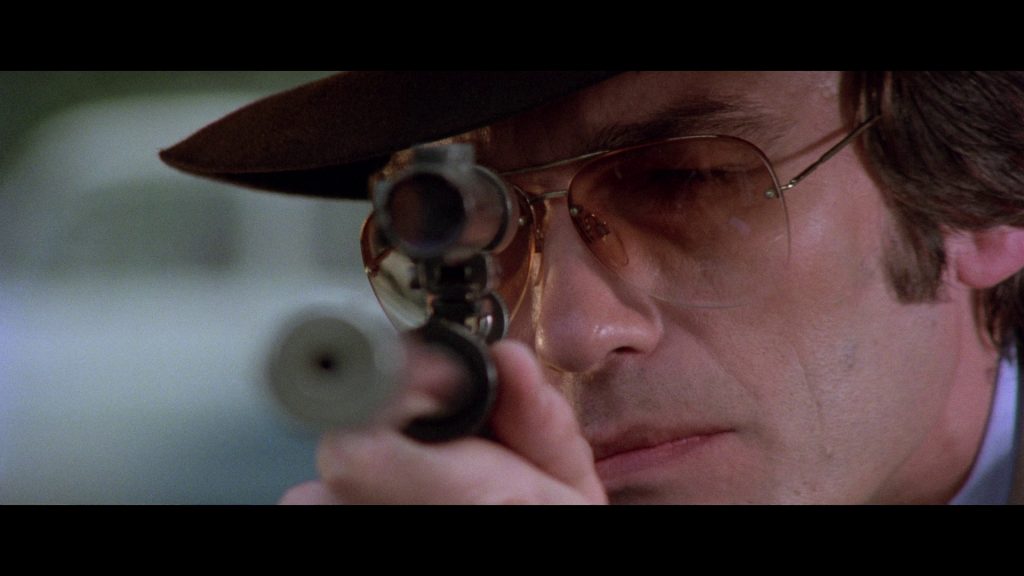
Colt 38 Special Squad (1976)
The city of Turin is in the grip of a brutal crime boss known as “the Marseillaise” (Ivan Rassimov, Your Vice is a Locked Room and Only I Have the Key), and plenty of cops have good reason to want him dead – none more than Inspector Vanni (Marcel Bozzuffi, The French Connection), whose wife was murdered by the ruthless gangster. Having exhausted every other avenue, Vanni forms a crack squad of motorcycle-riding, shotgun-toting elite officers, tasked with meting out justice on the margins of the law. But when the Marseillaise launches a bombing campaign designed to extort a vast ransom from the city’s authorities, Vanni finds himself in a race against time to exact his revenge and avert disaster. Bearing a strong resemblance to the Dirty Harry sequel Magnum Force and featuring thrilling motorbike chases and a memorable theme song sung by Grace Jones, Colt 38 Special Squad ranks as one of the most unabashedly entertaining entries in the poliziotteschi canon – a faced-paced, no-holds-barred cop thriller and the swansong of its director, Massimo Dallamano (What Have They Done to Your Daughters?), who tragically died in a car accident just months after its release.
This film begins with a bang as police captain Vanni (Marcel Bozzuffi) takes out a criminal in the midst of a violent crime. The only trouble is this now-deceased fellow is the brother of a merciless Marseilles crime lord known as the Marsigliese (Ivan Rassimov), and he swiftly evens the score by taking out Vanni’s wife right in front of his son. You can feel right away that this film is not going to pull any punches as Vanni cobbles together a ragtag group of rogue cops to dish out some much-needed justice in the community that standard police work cannot handle. Especially in the times we are living in now, unchecked authority amongst the police is not the best idea and this film does not treat it as such. These men harm just as much as they help in the course of their duties – even if they ultimately do more good than bad. Take for example a pursuit they instigate that leaves a cop run over in a brutally stark fashion.
The set pieces in this film are very impressive with the motorcycles serving as an interesting touch that has them flying all around the screen. A scene near the end involving a car driving on a moving train is one of the most beautifully captured and inventive shots I have seen in some time. This film is often unsparing when it comes to violence from fingers being mangled in closed doors to people being exploded by dynamite. The cat-and-mouse game between the law and the villains makes for a very compelling film even if you might feel that character development is lacking. You have to question the way that authority is portrayed within this film, but you would not be alone if you find yourself swept up by this gleefully violent tale.
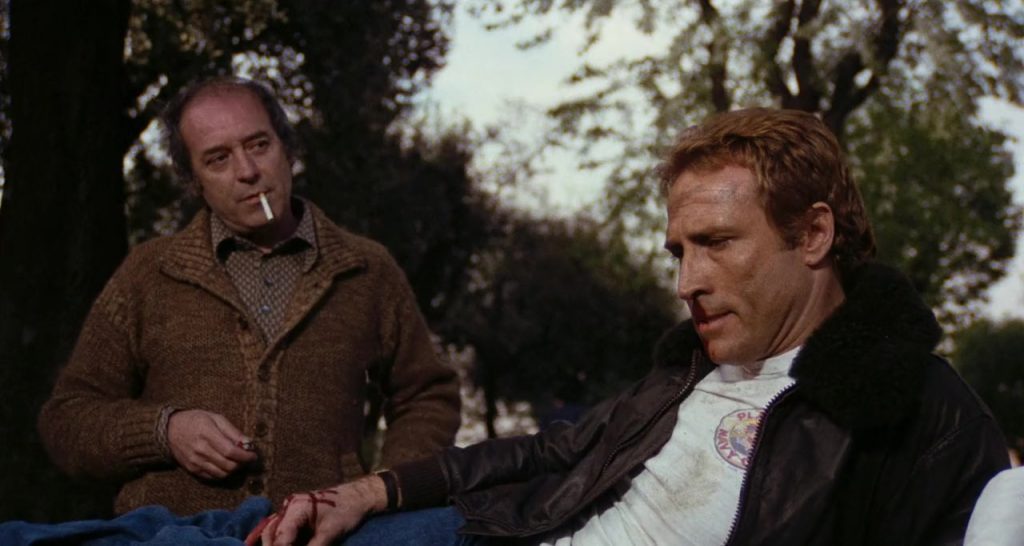
Highway Racer (1977)
Devil-may-care driving ace Marco Palma (Maurizio Merli, Violent City) of the Rome police’s Mobile Squad has a reputation for risk-taking – making him the perfect candidate for an undercover op to take down “Il Nizzardo” (Angelo Infanti, The Godfather), a fellow hotrodder and the ringleader of a band of bank robbers. Posing as a crook himself, Palma soon inveigles his way into Il Nizzardo’s group. But with only his wits and a souped-up Ferrari 250 GTE sports car to rely on, can Palma fly under the radar long enough to take down his nemesis, or will the ruthless gangster sniff him out and put paid to his daredevil antics once and for all? Loosely inspired by the exploits of real-life police driving ace Armando Spatafora, this action-packed thriller kickstarted a highly successful partnership between star Merli and veteran poliziotteschi director Stelvio Massi (Magnum Cop). Featuring a catchy score by maestro Stelvio Cipriani (Colt 38 Special Squad) and daring, high-octane driving stunts by regular Bond stunt coordinator Rémy Julienne, Highway Racer is one of the most adrenaline-pumping entries in the genre.
Highway Racer features some of the most exciting practical car chases that I have ever seen put to film. The stakes are established right away as Marco Palma (Maurizio Merli) shows his recklessness in his pursuit to capture criminals. The former troublemaker himself is now on the “right” side of the law and he wants to risk everything in high-speed pursuits to catch a band of robbers. The first time out results in a rather spectacular crash that halts his pursuit, and this is only one of a great many cars that will be destroyed throughout the film. Much of the power of the film comes from the fact that it takes a lot from Marco to learn from his mistakes, and it is only when he has blood on his hands that he snaps out of his tunnel vision somewhat. Angelo Infanti gives a surprisingly nuanced performance as the notorious antagonist il Nizzardo, a savvy bank robber who believes there is an etiquette to proper vehicular pursuit. The film plays with themes of mutual respect and tenacity in a really interesting way. There is even a strangely poetic conclusion to the film that took me by surprise. As mentioned, the stunt work on this film goes beyond comprehension into something dangerous. The way in which this film delivers pulse-pounding action with strong character works makes it one of the strongest of the set.
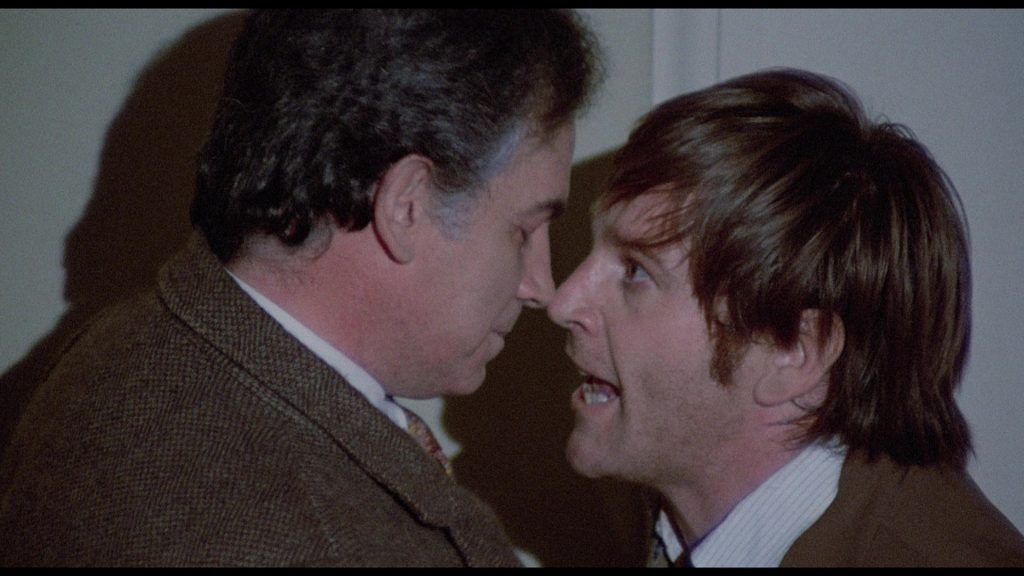
No, The Case Is Happily Resolved (1973)
While out fishing at a tranquil lakeside one peaceful afternoon, Fabio Santamaria (Enzo Cerusico, Blood and Black Lace) inadvertently witnesses the brutal murder of a young woman. Terrified that he too will be targeted by the maniac, Fabio resolves to keep his head down and say nothing. However, the killer – respected Professor Ranieri (Riccardo Cucciolla, Rabid Dogs) – secretly hatches a plot to avert suspicion by framing Fabio for the crime. And, as he frantically protests his innocence, Fabio quickly discovers that the entire system is stacked against him…Co-starring Enrico Maria Salerno (The Bird with the Crystal Plumage) and Martine Brochard (Murder Obsession), this bleak, angry thriller from director Vittorio Salerno (Savage Three) – whose original ending was deemed too pessimistic by the distributor – throws into stark relief the power afforded by social status and the unequal manner in which the law is dispensed.
This final film in the set is a much different beast than the other four features, but it is very impactful in its own personal way. The film opens with a frantically shot murder of a young woman in a manner that is quite visceral. The ensuing scene of the witness to the murder fleeing from the crime scene presumably to find a police officer as you question whether or not he is being followed by the perpetrator is quite thrilling and disorienting. It is only when you realize that this man has become too afraid to go to the police that you get a knot in your stomach of another kind. The kind of knot of rage that forms when there is a character on screen who is acting in a ridiculous manner that no reasonable person would replicate on their worst day. No, The Case Is Happily Resolved is not a bad film, but it is incredibly frustrating as our “hero” keeps making his life worse with one poor decision after another that has you screaming at the screen. Thankfully, the execution of the film around him is enough to keep you from throwing something at your television as the flawless performance from Riccardo Cucciolla and the investigation from the reporters keep you glued to the screen. The distributor wimped out from including the ending that it should have had (included in the special features), but the way in which this narrative tackles power dynamics and trust in authority is pretty magnificent.
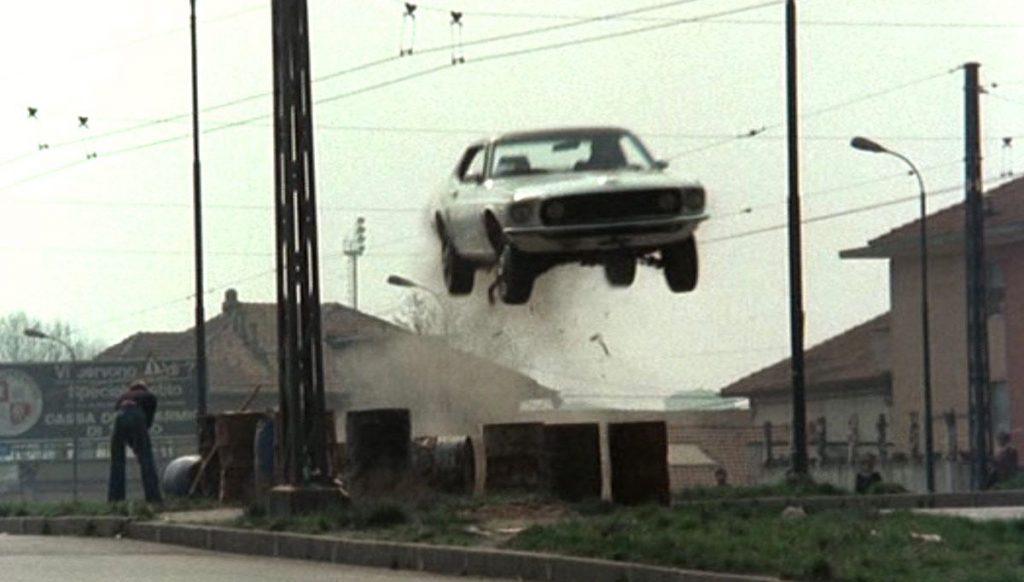
Video Quality
The five films in the Years of Lead box set make their domestic Blu-Ray debut thanks to Arrow Video with brand new 1080p masters in their original aspect ratios. Each of these films have been restored from their original camera negatives with Colt 38 Special Squad being granted a 2K scan exclusive to this release and the remaining four masters being provided from companies that released them on Blu-Ray overseas. By and large these five releases are very similar to one another and will be discussed as a group with any meaningful differences pointed out.
The only word to describe these presentations is beautiful. The lovely photography which captures the gritty 70s era of Italy sparkles in high definition with natural grain intact and nicely resolved. There is a fantastic amount of detail present with nice textures on the clothing, both in the fancy clothing of some of the antagonists to the shabby street clothing of some of the officers. The new transfer shows off a great amount of depth and enhanced detail, but admittedly the close-up shots hold up better than the long shots. There are certain elements like smashed up vehicles or gunshot wounds that look quite striking in their clarity. Black levels are very deep with no trace of black crush or compression artifacts. Some very minor color temperature fluctuations give certain darker scenes a more milky appearance such as in Highway Racer, but for the most part this is not an issue. The contrast is well defined, and there is virtually no print damage to be found outside a few stray moments such as in Like Rabid Dogs. Arrow Video has done a miraculous job with all of these transfers in a way that should make anyone who decides to pick this set up extremely happy.
Audio Quality
Savage Three and Like Rabid Dogs come with a DTS-HD 1.0 Master Audio mono track in the original Italian, while Colt 38 Special Squad, Highway Racer and No, The Case Is Happily Resolved are give an LPCM 1.0 mono tracks in the original Italian, with an additional English language option for the former two. Every single one of these tracks represents these worlds in a pretty impressive way sonically. Most of these films have their dialogue post-looped which results in some loose sync instances that may be annoying to some, but it is a product of this period in filmmaking. These tales mostly take place in a bustling city which creates a din of sound that creeps through to provide some excellent ambient details. All of the various sounds in the mix seem accurately rendered so that nothing ever feels off. The dialogue itself comes through crystal clear without being crushed by the sound effects or score. There are many moments of gunshots that pack enough of a punch without becoming a muddled mess in the ensuing chaos. The memorable music throughout these five films brings a very distinct mood to the proceedings that is represented well in the mix. Everything is presented with an excellent fidelity with only the occasional instance of sound presenting as a bit thin or boxy. This presentation is free of any hiss or other age-related wear-and-tear. Another 5-star effort from Arrow Video.
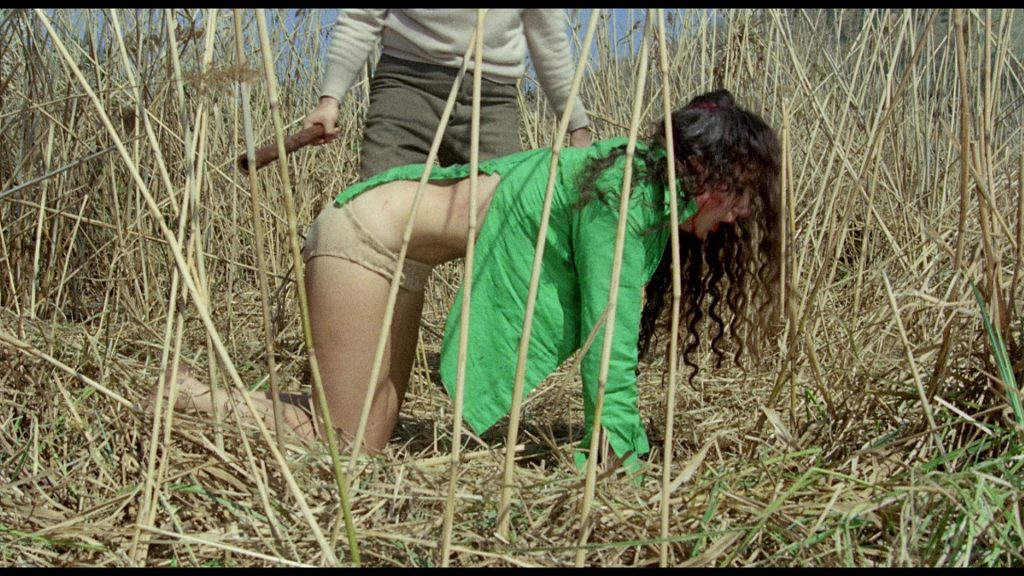
Special Features
The Limited Edition Collector’s Set of the Arrow Video Blu-Ray of Years Of Lead: Five Classic Italian Crime Thrillers 1973-1977 comes beautifully packaged in a hard outer case and includes a 58-page bound book featuring the essays “Don’t Trust The Man: No, The Case Is Happily Resolved and Italian Genre Cinema of the 70s” by Troy Howarth, “Animal Instinct: Savage Three and the Ideology of Violence” by Michael Mackenzie, “Fighting Fire with a Colt 38: Law and Order In Colt 38 Special Squad” by Rachael Nisbet, “Like Rabid Dogs: Class, Privilege and Sadeian Women” by Kat Ellinger and “The Car’s The Star: Highway Racer, Tribute Elegy and a Whole Lot of Burning Rubber” by James Oliver. These works provide a great analysis of each film and the genre at large in a thoughtfully written style. The on-disc special features are as follows:
Savage Three
- Rat Eat Rat: A 41-minute interview with writer and director Vittorio Salerno and actress Martine Brochard in which they discuss the changing business climate in Italian filmmaking around this time, the socio-political climate of the time, the initial script that inspired him, the process of shooting the film and more.
- The Savage One: A 41-minute interview with actor Joe Dallesandro in which he discusses his accidental start in the business, his work with Andy Warhol and Paul Morrissey, the over-the-top violence in the film, his troubles with alcoholism and more.
- Poster: A singular poster is provided here.
Like Rabid Dogs
- When A Murderer Dies: A 52-minute interview with cinematographer Romano Albani and film historian Fabio Melelli in which the cinematographer discusses his beginnings in commercials and movies, the respect he had for director Mario Imperoli, the small nature of the production, the performances in the film and much more.
- It’s Not A Time For Tears: A 33-minute interview with assistant director Claudio Bernabei in which he discusses how he got started with Imperoli, the stylistic choices in the film, memories of the shooting locations, the impact of advertising agencies on certain product placement and more thoughtful insights.
- Theatrical Trailer: The nearly four-minute trailer is provided here which shows too much of the film.
- Music Sampler: Two tracks totaling six minutes from the original soundtrack by Mario Mlino are provided here.
- Poster Gallery: A series of posters are provided here.
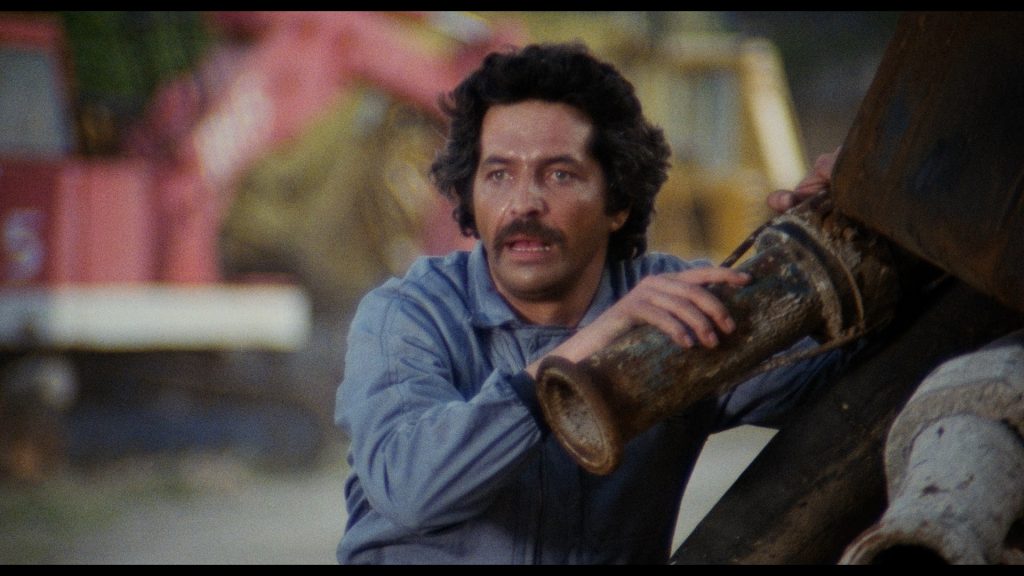
Colt 38 Special Squad
- Introduction by Stelvio Cipriani: A 45-second introduction from the film’s composer in which he plays a piece he wrote for the opening.
- Always the Same Ol’ Notes: A 26-minute interview with composer Stelvio Cipriani in which he discusses how he got involved with the film, developing the sound of the story and more interesting insights into his creative process.
- A Tough Guy: A nearly 10-minute interview with editor Antonio Siciliano in which he discusses his initial meeting with director Massimo Dallamano, the disturbing nature of the picture, his thoughts on the film, the performances in the picture and more.
- Theatrical Trailer: The three-and-a-half minute trailer is provided here which gives away quite a bit of the film.
- Poster Gallery: A series of posters are provided here.
Highway Racer
- Faster Than A Bullet: A 20-minute interview with film historian Roberto Curti from 2019 which delves into the themes of the film, the cultural climate at the time of release, how this film differs from others in the genre, the performances, the execution of the car chases and more.
- Poster Gallery: A series of posters are provided here.
No, The Case Is Happily Resolved
- Poliziotteschi – Violence and Justice In The Years Of Lead: A new 20-minute visual essay from Will Webb which explores the themes of this subgenre, the real-life political environment that inspired the genre, the specific motifs that recur from film to film, the exaggerated violence and casual misogyny, and more. This is a well put together piece that is worth a look.
- Mother Justice: A nearly 41-minute interview from 2015 with writer and director Vittorio Salerno in which the filmmaker discusses the origins of the project, the casting of the film, securing funding for the feature, the look of the film, the soundtrack and much more that helps bring a greater context to the work.
- Alternate Ending: A four-minute alternate ending deemed too pessimistic by the distributor which makes the film feel more realistic and less rushed by the end. They should have stuck with this.
- Theatrical Trailer: The three-and-a-half minute trailer is provided here which gives away quite a bit of the film.
- Poster Gallery: A series of posters are provided here.
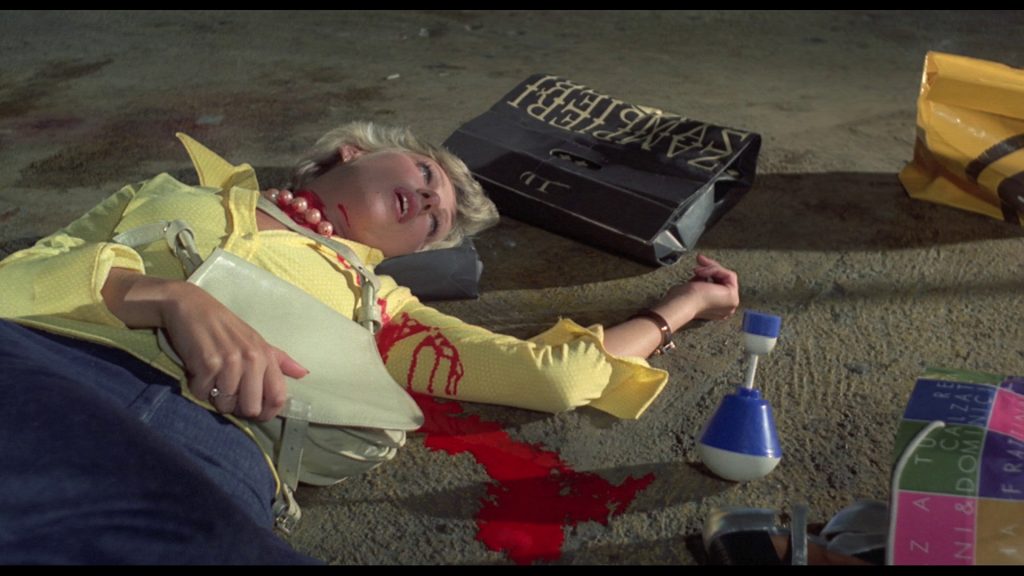
Final Thoughts
Years Of Lead: Five Classic Italian Crime Thrillers contains a diverse array of really powerful and thrilling crime dramas that show different vantage points of justice. Some films are stronger than others, but there is not a bad film in the bunch if you are one who enjoys gritty, violent, and occasionally tawdry crime films. The level of talent both in front of and behind the camera is something mightily impressive that shows off some of the best the genre has to offer for newcomers. Arrow Video has released another stunning box set featuring a nearly 5-star A/V presentation, engrossing special features, and top-notch packaging. Those who have the stomach for it will love every minute they spend with this set. Highly Recommended
Years Of Lead: Five Classic Italian Crime Thrillers 1973-1977 is currently available to purchase on Blu-Ray.
Note: Images presented in this review are not reflective of the image quality of the Blu-Ray.
Disclaimer: Arrow Video has supplied a copy of this set free of charge for review purposes. All opinions in this review are the honest reactions of the author.

Dillon is most comfortable sitting around in a theatre all day watching both big budget and independent movies.


